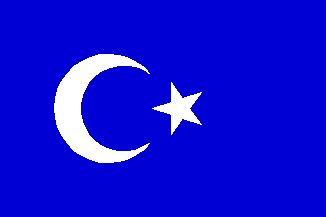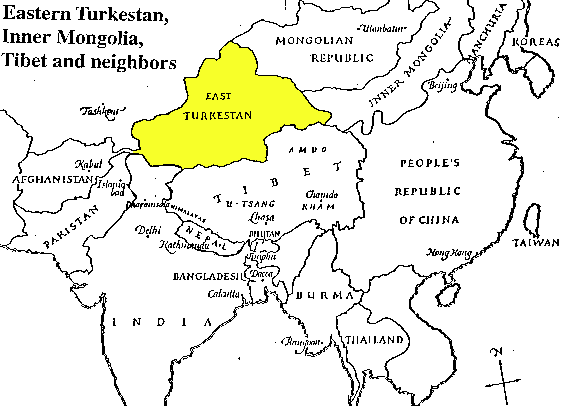





Uighur militants in Xinjiang have been struggling for decades to establish an independent East Turkestan. In 1933 and 1944, the Uighurs were successful in setting up an independent Islamic Eastern Turkestan republic. But these independent Islamic Republics were overthrown by the military intervention of the Soviet Union. In 1949 the Nationalist Chinese were defeated by the Chinese communists and Eastern Turkestan fell under Chinese communist rule.
The Committee for Eastern Turkistan, based in Alma-Ata, Kazakhstan, is probably the most radical national movement in Central Asia. The Committee has recently become more militant and has vowed to intensify their struggle in a bid to free Xinjiang from growing Chinese influence. It was originally formed by Uighur guerrillas who fought against the Chinese in the period of 1944-1949. In 1945 Muslim freedom-fighters took up arms and set up an independent Turkestan Republic in a mass-uprising supported by the Soviet Union. Their leader of the 1940s, Aysa Beg, fled to Turkey in 1949 after the Communists came to power.The situation in Xinjiang for Muslims is extremely severe. Uighurs are being arbitrarily detained. Thousands of Uighur political prisoners are in jail and are being tortured. There have been very violent repressions of protest, mass closings of Koranic schools, a large number of death sentences for religious protesters.
In 1990, the Uighurs, Kirghiz and Kazakhs of Eastern Turkestan again rose up against Chinese rule. In April in the remote town of Akto, more than 1000 residents, furious at not being allowed to build a mosque, took to the streets. More than 60 people were killed in clashes with Chinese troops. In July 1990 the authorities in Xinjiang announced the arrest of 7,900 people in a crackdown on "criminal activities of ethnic splittists and other criminal offenders."The "Strike Hard" anti-crime campaign launched in 1996 was announced as an initiative to answer citizens' legitimate concerns about rising crime through a high-intensity series of high-profile police actions. The "Strike Hard" campaign never officially came to an end, though it faded from the scene in most urban areas. In minority areas, however, it is a different story. Particularly in Xinjiang province, home to the Muslim Uighur nationality, the "Strike Hard" work appears to be going full-tilt, clearly a tool being used to justify harsh measures against political activists, including many well publicized executions of accused pro-independence activists.
On the eve of Ramadan on 05 February 1997 in Ghulja, believers were offended by the arrests of 30 prestigious religious leaders by the Chinese Government. Six hundred young people took to the streets, walking toward city government, demanding release of those religious figures. On their way, they were stopped by police and the paramilitary forces. Police violently dispersed crowds using electrical clubs, water cannon, and tear gas in the freezing day. The second day, an even bigger demonstration was held after Uighurs all over town heard about the incident. Chinese police and paramilitary forces were ordered to shoot to the crowd, and killed 167 people, and succeeded in suppressing the rally. Afterwards, the Chinese policemen arrested over 5,000 demonstrators, including elder, young women and children in a single day on the charge of intending to split the motherland, conducting criminal activity, fundamental religious activity, and counter-revolutionary element.The Chinese Government subsequently made the first open execution of seven Uighurs in order to 'kill the chicken to scare the monkeys.' Chinese military forces loaded them on to the open truck and drove slowly through the busy Uighur bazaar and neighborhoods through a crowd. When the mourners got too close to the trucks, the Chinese soldiers opened fire and killed nine more people.
Anwar Yusuf, president of the Eastern Turkistan National Freedom Center, was one of several independence leaders who gathered in Taiwan February 25 to 28, 1998, for public and private meetings and numerous press interviews. Invited by the World Federation of Taiwanese Association in the U.S., Yusuf was joined by prominent Eastern Turkistani activist Erkin Alptekin; Professor Thubtin Jigme Norbu, elder brother of His Holiness the Dalai Lama; Tashi Jamyangling, former Home Secretary of the Tibetan Government in Exile; and Johnar Bache, Vice Chairman of the Southern Mongolian People's Party. The independence leaders met with leading Taiwanese, in and out of government, including Liu Sung-pan, the president of Taiwan's Legislative Yuan; Shui-Bian Chen, Mayor of Taipei; and Frank C.T. Hsieh, Mayor of Kaosiung.Following the death of the exile East Turkestan leader Isa Yusuf Alptekin, who advocated non-violence and was called the Turkic Dalai Lama, no-one has had the authority to prevent militant resistance against Chinese rule in Xinjiang. Branded as "Xinjiang's Hamas," the Home of East Turkestan Youth is a radical group committed to achieving the goal of independence through the use of armed force. It has some 2,000 members, some of whom have undergone training in using explosive device in Afghanistan and other Islamic countries.

